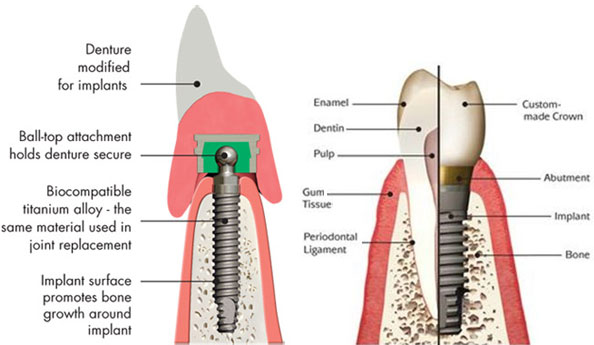Download Our Dental Implant
Pricing & Information Guide
you the guide along with a $350 savings offier!

The Guide will show you
- Dental Implant Options
- Average Pricing
- Factors That Affect Eligibility
- And More…
Everything you need to know about dental implants:

A dental implant is a surgically placed titanium screw which can hold a tooth or several teeth in place. After the surgical placement of the dental implant, the process of ossentegration occurs and the surrounding bone and implant surface fuse together. The dental implant acts as a replacement to the lost root of a tooth. This “root” can then be used to support single teeth, or joined together to support multiple teeth or stabilize dentures.
- Would you like to replace one or more missing teeth with something fixed in place?
- Are you having problems eating, chewing or speaking properly due to missing teeth?
- Do you have a bridge that is loose?
- Do your dentures move around when you chew?
- Do you get frequent sore spots from your denture or need “paste” to hold it in?
- Do you have a partial denture but never wear it?
If you answered “yes” to any of these questions you may be a candidate for dental implants. There are almost no absolute contraindications for dental implants, although certain conditions will put patients in a higher risk category (i.e. smoking, uncontrolled diabetes, autoimmune disorders, etc.).
Dr. Claiborne has a 95% success rate to date with hundreds of implants placed. Most literature will state a 90-95% survival rate for 10 years. Patients who smoke have an increased risk of failure (usually 2.5 times greater than a non-smoker). The first dental implant was placed in 1965 and is still in function today. The best way to ensure long term success is with good oral hygiene and 6 month cleaning appointments with radiographic follow-up of your implants.
Typically dental insurance does not cover dental implants. But we are seeing some insurance carriers start to cover them. Because Dr. Claiborne performs both the surgical aspect and the prosthetic aspect of implant dentistry, he is able to pass substantial savings onto his patients. See payment options.
- Ill-fitting dentures just get worse.
- Remaining teeth are subjected to stresses and pressures.
- Jaw structure can deteriorate faster when teeth are missing.
- Many denture wearers avoid eating healthy foods (such as fresh vegetables) because of difficulty chewing.





 (434) 542-8679
(434) 542-8679